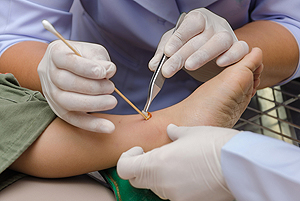 Looking after and staying on top of the health of your feet is an important part of living with diabetes. Even seemingly small problems can have serious consequences. A cut or scrape may go unnoticed due to reduced circulation and sensation in the feet, and this same cut or scrape can turn into a deep wound. Left untreated, the wound can become infected and increase the risk of needing an amputation. To avoid these complications it is suggested that people with diabetes inspect their feet daily, wear clean and comfortable shoes, avoid walking barefoot, and never treat corns and calluses on their own. Periodic checkups by a podiatrist to continuously assess foot health is highly recommended. If you have diabetes, consult with a podiatrist today who can help you take care of your feet.
Looking after and staying on top of the health of your feet is an important part of living with diabetes. Even seemingly small problems can have serious consequences. A cut or scrape may go unnoticed due to reduced circulation and sensation in the feet, and this same cut or scrape can turn into a deep wound. Left untreated, the wound can become infected and increase the risk of needing an amputation. To avoid these complications it is suggested that people with diabetes inspect their feet daily, wear clean and comfortable shoes, avoid walking barefoot, and never treat corns and calluses on their own. Periodic checkups by a podiatrist to continuously assess foot health is highly recommended. If you have diabetes, consult with a podiatrist today who can help you take care of your feet.
Wound care is an important part in dealing with diabetes. If you have diabetes and a foot wound or would like more information about wound care for diabetics, consult with Dr. Mark Gagnon from Advanced Podiatry. Our doctor will assess your condition and provide you with quality foot and ankle treatment.
What Is Wound Care?
Wound care is the practice of taking proper care of a wound. This can range from the smallest to the largest of wounds. While everyone can benefit from proper wound care, it is much more important for diabetics. Diabetics often suffer from poor blood circulation which causes wounds to heal much slower than they would in a non-diabetic.
What Is the Importance of Wound Care?
While it may not seem apparent with small ulcers on the foot, for diabetics, any size ulcer can become infected. Diabetics often also suffer from neuropathy, or nerve loss. This means they might not even feel when they have an ulcer on their foot. If the wound becomes severely infected, amputation may be necessary. Therefore, it is of the upmost importance to properly care for any and all foot wounds.
How to Care for Wounds
The best way to care for foot wounds is to prevent them. For diabetics, this means daily inspections of the feet for any signs of abnormalities or ulcers. It is also recommended to see a podiatrist several times a year for a foot inspection. If you do have an ulcer, run the wound under water to clear dirt from the wound; then apply antibiotic ointment to the wound and cover with a bandage. Bandages should be changed daily and keeping pressure off the wound is smart. It is advised to see a podiatrist, who can keep an eye on it.
If you have any questions, please feel free to contact one of our offices located in Crestwood, Orland Park, and Summit, IL . We offer the newest diagnostic and treatment technologies for all your foot care needs.
